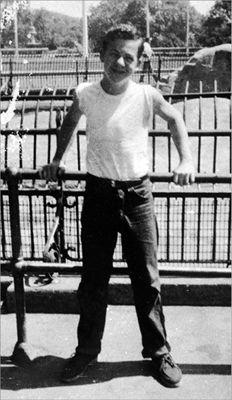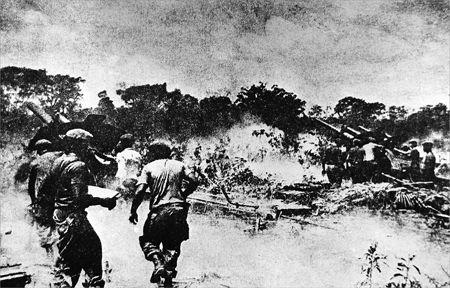Kennedy's Last Days: The Assassination That Defined a Generation (11 page)
Read Kennedy's Last Days: The Assassination That Defined a Generation Online
Authors: Bill O'Reilly
This photograph of Marina Oswald was in Lee Harvey Oswald’s wallet when he was arrested.
[© Corbis]
Very quickly, life is complicated for Lee Harvey Oswald. The former bachelor now has two people to provide for, and he has to figure out if he can take a Soviet citizen with him back to the United States.
This marriage is important to Oswald. It makes him feel adult and in charge. But he doesn’t really know what a good marriage is. Oswald hasn’t seen one close up in his life. His father dies before he is born and his mother sends him to an orphanage when he is four years old. When she finally takes him back for good, he is twelve. They move from New Orleans to New York City, where Marguerite Oswald works all day in a dress shop. Lee drifts around the city, traveling by subway, when he should be in school.
One day he picks up a flyer about two people who are about to be executed for spying for Russia. Oswald writes in his diary: “I was looking for a key to my environment, and then I discovered socialist literature. I had to dig for my books in the back dusty shelves of libraries.”

Young Lee at a zoo in New York.
[© Corbis]
Oswald never finishes school. He joins the Marines when he is seventeen and is trained in marksmanship. But he can’t seem to fit in. He is court-martialed twice, once for having an illegal pistol and once for attacking a sergeant. Very soon, he is learning Russian and making plans to defect to the Soviet Union. He lasted three years in the Marines and has been in the Soviet Union for two. It seems that Lee Harvey Oswald hasn’t found a place to belong.
CHAPTER EIGHT
APRIL 17, 1961
Washington, D.C./Bay of Pigs, Cuba 9:40
A.M.
J
OHN
F
.
K
ENNEDY ABSENTMINDEDLY
buttons his suit coat. He is seated aboard
Marine One
, his presidential Marine Corps helicopter, as it lands on the South Lawn of the White House. He has just spent a most unrelaxing weekend at Glen Ora, the family’s rented country retreat in Virginia.
Kennedy is preoccupied with Cuba. A battlefield is taking shape there. Kennedy has authorized a secret invasion of the island nation, sending 1,400 anti-Castro exiles to do a job that the U.S. military, by rule of international law, cannot do itself. The freedom fighters’ goal is nothing less than the overthrow of the Cuban government. The plan has been in the works since long before Kennedy was elected. Both the Central Intelligence Agency and the Joint Chiefs of Staff representing the Army, Navy, Air Force, and Marines have assured the president that the mission will succeed. But it is Kennedy who has given the go-ahead, and it is he who will take the blame if the mission fails.

In the days leading up to the scheduled invasion, President Kennedy reviewed the CIA’s plan. He wanted the invasion to seem as if it had been generated solely by Cuban exiles, thereby masking American government involvement. This required an out-of-the-way landing area where men and supplies could go ashore quietly, then slip into the countryside unnoticed.
The CIA suggested a location, known as Bahía de Cochinos—loosely translated as the “Bay of Pigs.” The landing would take place at night.
On April 14, just two days after giving a press conference in which he promised there would be no intervention by U.S. forces in Cuba, Kennedy gave Operation Zapata, as the Bay of Pigs invasion was known, the official go-ahead.
April 14 was a Friday. After launching the invasion, there was nothing for the president to do but wait. So he flew to Glen Ora to be with Jackie and the kids, where he endured a gut-wrenching weekend waiting for news from Cuba. When word finally came, almost none of it was good.
It started on Saturday morning, when eight B-26 bombers piloted by Cuban freedom fighters attacked three Cuban air bases. The bombings barely damaged the Cuban air force. But Fidel Castro was furious. He immediately accused the United States of involvement in the attack.
Things only got worse after that. A diversionary landing on Saturday was supposed to put about 160 anti-Castro Cuban freedom fighters ashore near Guantánamo Bay, but it was canceled when a crucial boat broke down. In a separate incident, Cuban forces arrested a small band of freedom fighters who were already on the island.
By Saturday afternoon, the Cuban ambassador to the United Nations was addressing the General Assembly, denouncing the United States for its attack—in response to which Adlai Stevenson, the U.S. ambassador, repeated JFK’s promise that no American forces would ever wage war in Cuba.

This photo, printed in a Cuban newspaper, shows the Cuban army attacking the U.S.-backed freedom fighters.
[© Bettmann/Corbis]
In the dead of night, just after Sunday turned to Monday, the landing force of 1,400 Cuban exiles from Brigade 2506 powered toward the Bay of Pigs aboard a small fleet of freighters and landing vessels. Their hopes were high—their dream was to regain control of their homeland.
* * *
John Kennedy stands in the Oval Office, helpless to stop what he has started. At his side is his brother Bobby, his closest friend and adviser.
The news from the landing beaches is not good: The freedom fighters have failed to secure key roads and other strategic points. There is no way off the beach for the men of Brigade 2506. Cuban forces have pinned them down. The invasion is stalled.
A distraught JFK shares his fears with Bobby. The president knows when speaking with his brother that he is safe from security leaks or attempts to undermine his authority. But even now, with Bobby at his side, John Kennedy feels the crushing loneliness of being the president of the United States. He has made this mess in Cuba. If only he can find a way to turn this disaster into a victory.
But that is not to be.
April 19, 1961
In a last-ditch attempt to salvage the invasion, the president reluctantly authorizes one hour of air cover starting at 6:30
A.M.,
to be provided by six unmarked jets from the Navy aircraft carrier
Essex
. The jets are to rendezvous with the B-26 bombers piloted by Cuban freedom fighters and keep the Cuban aircraft at bay.
Now there is more bad news: incredibly, the CIA and the Pentagon didn’t account for the time zone difference between Cuba and the freedom fighters’ air base in Nicaragua. Jets from the
Essex
and the B-26 bombers from Nicaragua arrive at the rendezvous one hour apart. The two groups of aircraft never meet up. As a result, several B-26s and their pilots are shot down by the Cuban air force. Pierre Salinger, the president’s press secretary, discovers Kennedy alone in the White House residence, weeping after hearing the news.

Robert Kennedy was his brother’s closest friend and confidant. Here they stand outside the door leading to the Oval Office.
[JFK Presidential Library and Museum]
By 5:30
P.M.
on the night of April 19, Cuban forces have taken complete control of the Bay of Pigs. The invasion is over.
In addition to the dead and captured on the ground, Castro’s forces have sunk almost a dozen invasion vessels, including those carrying food and ammunition, and shot down nine B-26 bombers.
The defeat is a major humiliation for the United States. Kennedy is forced to give a press conference and take full blame. “There’s an old saying that victory has a hundred fathers and defeat is an orphan.…” What matters, he says, is that “I am the responsible officer of the government.”
Amazingly, Kennedy’s approval rises to 83 percent after the invasion, proving to the president that the American people stand firmly behind his actions against Castro. The rating temporarily makes him one of the most popular presidents of the 20th century.
* * *
Meanwhile, in the Soviet Union, the U.S. State Department has decided to return Lee Harvey Oswald’s American passport to him and allow him to return home. He delays his departure until Marina and their unborn child can travel with him.
He also puts off telling Marina that they are going anywhere.
At last, Oswald breaks the news. “My wife is slightly startled,” he writes in his journal in June, after finally telling Marina that they are leaving the Soviet Union, most likely forever, “but then encourages me to do what I wish to do.”
Marina is on the verge of leaving behind everything she knows for a life of uncertainty with a man she barely knows. But she accepts this hard reality because she has already learned one important thing about Lee Harvey Oswald: He always does what he wants to do, no matter how many obstacles are thrown in his path.
Always.

[© Corbis]
CHAPTER NINE
FEBRUARY 14, 1962
Washington, D.C. 8:00
P
.
M
. EST on NBC and CBS TV